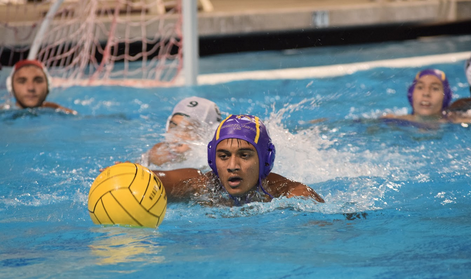Two games. That’s how many games the MVHS boys water polo team has won this season. And those two almost turned into three in the Matadors’ game on Oct.16 against Harker HS. The game was close for the first three quarters with MVHS playing catch-up every time HHS got ahead. But as MVHS fell short in the last three minutes of the game, HHS was able to run down the clock and secure the win. MVHS was left with their second loss against HHS 8-9.
The first goal of the game was made by MVHS, earning a loud applause from the crowd. As the match went on and the scores climbed, the crowd grew louder, cheering for their respective players when they scored, complaining against bad calls. Several MVHS players were ejected from the game for not complying with the rules. Nonetheless, the second game against HHS was the boys’ closest game of the season, and showed improvement since the first, a loss to HHS 6-14.
Read below to learn about one of the referees of the game.
An official look
In order to respect the referee’s wish to remain anonymous, we will refer to him as TIm.
After his daughter graduated from college and went back to her high school to teach and coach water polo, Tim decided that he wanted to try reffing for the sport. Having played water polo for a semester in college, he was familiar with the environment of the game and recognized the engagement in the sport needed to  be a good ref.
be a good ref.
“You have to enjoy it and have a great love of the sport,” Tim said. “I like seeing good plays and good coaching. It’s always entertaining.”
For Tim, reffing for water polo games helps alleviate the stress from his job and allows him to clear his mind and only focus on the game, whether it be ensuring that players are obeying the rules or simply watching for enjoyment.
But being a referee has its drawbacks. They call the shots. They call out the players. They essentially run the game.
They’re the judges, and their call can indirectly determine the winner and the loser of the game. And so many people present at games – including players, coaches and even parents – often seek to influence the call of a referee.
This can result in arguments between the refs and the complainers, and for water polo, it can result in an ejection from the game. Players who commit a major foul are directed by the referee to go to the penalty box for twenty seconds. As an excuse from the game for such a period of time, the opponent is given an advantage. And that is what can spark altercations. Not everyone sees the game the same way, so it is up to the referee to determine who is at fault.
Tim understands the stigma of being a referee and says he simply uses earplugs to help ignore complaints from angry parents in the crowd or the coaches. If the complaints come to a point where they are interfering with the flow of the game, the A.D., or the person in charge of the pool deck, should be notified, and the complainer will be removed from the scene. The referee’s call is final and, by the rules, should not be tampered by the arguments of others.
“There’s a certain decorum to the game,” Tim said. “The way players interact with players, the way players interact with coaches and the way coaches interact with the players and the officials.”










